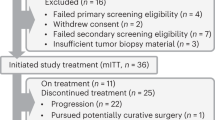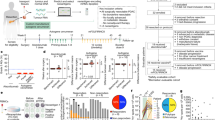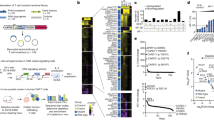Abstract
In a preclinical model for prostate cancer gene therapy, we have tested lentiviral vectors as a practical possibility for the transfer and long-term expression of the EGFP gene both in vitro and in vivo. The human prostate cancer cell lines DU145 and PC3 were transduced using experimental conditions which permitted analysis of the expression from a single proviral vector per cell. The transduced cells stably expressed the EGFP transgene for 4 months. After injection of the transduced cell populations into Nod-SCID mice a decrease in EGFP was only observed in a minority of cases, while the majority of tumors maintained transgene expression at in vitro levels. In vivo injection of viral vector preparations directly into pre-established subcutaneous or orthotopic tumor masses, obtained by implantation of untransduced PC3 and DU145 cells led to a high transduction efficiency. While the efficiency of direct intratumoral transduction was proportional to the dose of virus injected, the results indicated some technical limitations inherent in these approaches to prostate cancer gene therapy.
This is a preview of subscription content, access via your institution
Access options
Subscribe to this journal
Receive 4 print issues and online access
$259.00 per year
only $64.75 per issue
Buy this article
- Purchase on Springer Link
- Instant access to full article PDF
Prices may be subject to local taxes which are calculated during checkout





Similar content being viewed by others
References
Boring CC et al. Cancer statistics, 1994. CA Cancer J Clin 1994; 44: 7–26.
Pound CR et al. Natural history of progression after PSA elevation following radical prostatectomy. JAMA 1999; 281: 1591–1597.
Shipley WU et al. Radiation therapy for clinically localized prostate cancer: a multi-institutional pooled analysis. JAMA 1999; 281: 1598–1604.
Huggins C et al. Studies on prostatic cancer. I. The effect of castration, of estrogen and androgen injection on serum phosphatases in metastatic carcinoma of the prostate. CA Cancer J Clin 1972; 22: 232–240.
Maitland NJ . Targeting therapeutic gene expression to human prostate cancers. Curr Opin Mol Ther 2000; 2: 389–399.
Steiner MS et al. Gene therapy for prostate cancer: where are we now? J Urol 2000; 164: 1121–1136.
Lu Y et al. Delivery of adenoviral vectors to the prostate for gene therapy. Cancer Gene Ther 1999; 6: 64–72.
Young LS et al. The promise and potential hazards of adenovirus gene therapy. Gut 2001; 48: 733–736.
Yu D et al. Prostate-specific targeting using PSA promoter-based lentiviral vectors. Cancer Gene Ther 2001; 8: 628–635.
Vigna E et al. Lentiviral vectors: excellent tools for experimental gene transfer and promising candidates for gene therapy. J Gene Med 2000; 2: 308–316.
Bagnis C et al. Viral vectors and gene markers: tools and challenges for scientists working blind on genetic modification of hematopoietic cells. In: Pandalai SG (ed). Recent Research Developments in Virology, Vol. 1. Transworld Research Network, Trivandrum, 1999, pp 217–228; Recent Res Dev Virol 1999; 1: 217–228.
Bastide C et al. A Nod Scid mouse model to study human prostate cancer. Prostate Cancer Prostatic Dis 2002; 5: 311–315.
Zufferey R et al. Self-inactivating lentivirus vector for safe and efficient in vivo gene delivery. J Virol 1998; 72: 9873–9880.
Gerolami R et al. Gene transfer to hepatocellular carcinoma: transduction efficacy and transgene expression kinetics by using retroviral and lentiviral vectors. Cancer Gene Ther 2000; 7: 1286–1292.
Sastry L et al. Titering lentiviral vectors: comparison of DNA, RNA and marker expression methods. Gene Therapy 2002; 9: 1155–1162.
Di Ianni M et al. 5-Azacytidine prevents transgene methylation in vivo. Gene Therapy 1999; 6: 703–707.
Kandel ES et al. Template switching by RNA polymerase II in vivo. Evidence and implications from a retroviral system. Mol Cell Biol 2002; 10: 1495–1502.
Halvas EK et al. Role of murine leukemia virus reverse transcriptase deoxyribonucleoside triphosphate-binding site in retroviral replication and in vivo fidelity. J Virol 2000; 74: 10349–10358.
Mizutani T et al. Maintenance of integrated proviral gene expression requires Brm, a catalytic subunit of SWI/SNF complex. J Biol Chem 2002; 277: 15859–15864.
Hanazono Y et al. Green fluorescent protein retroviral vectors: low liter and high recombination frequency suggest a selective disadvantage. Hum Gene Ther 1997; 8: 1313–1319.
Coleman JE et al. Efficient large-scale production and concentration of HIV-1-based lentiviral vectors for use in vivo. Physiol Genomics 2003; 12: 221–228.
Horig H et al. Prostate-specific antigen vaccines for prostate cancer. Expert Opin Biol Ther 2002; 2: 395–408.
Heiser A et al. Autologous dendritic cells transfected with prostate-specific antigen RNA stimulate CTL responses against metastatic prostate tumors. J Clin Invest 2002; 109: 409–417.
Acknowledgements
This work was supported by the Grant QLK6-CT-2000-00271 from the European Community on behalf of the PIG group (Prostate Cancer: Initiative for Gene Therapy), and by the GVPN (Gene Vector production Network).
Author information
Authors and Affiliations
Corresponding author
Rights and permissions
About this article
Cite this article
Bastide, C., Maroc, N., Bladou, F. et al. Expression of a model gene in prostate cancer cells lentivirally transduced in vitro and in vivo. Prostate Cancer Prostatic Dis 6, 228–234 (2003). https://doi.org/10.1038/sj.pcan.4500668
Received:
Revised:
Accepted:
Published:
Issue Date:
DOI: https://doi.org/10.1038/sj.pcan.4500668
Keywords
This article is cited by
-
A diphtheria toxin resistance marker for in vitro and in vivo selection of stably transduced human cells
Scientific Reports (2015)
-
Neutral endopeptidase inhibits prostate cancer tumorigenesis by reducing FGF-2-mediated angiogenesis
Prostate Cancer and Prostatic Diseases (2008)
-
Lentiviral vector neutral endopeptidase gene transfer suppresses prostate cancer tumor growth
Cancer Gene Therapy (2007)
-
Use of the PSA enhancer core element to modulate the expression of prostate- and non-prostate-specific basal promoters in a lentiviral vector context
Cancer Gene Therapy (2006)
-
Co-expression of α(1,3)galactosyltransferase and Bacillus thuringiensis PIPLC enhances hyperacute rejection of tumor cells
Cancer Immunology, Immunotherapy (2006)



